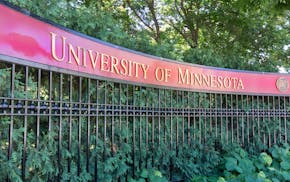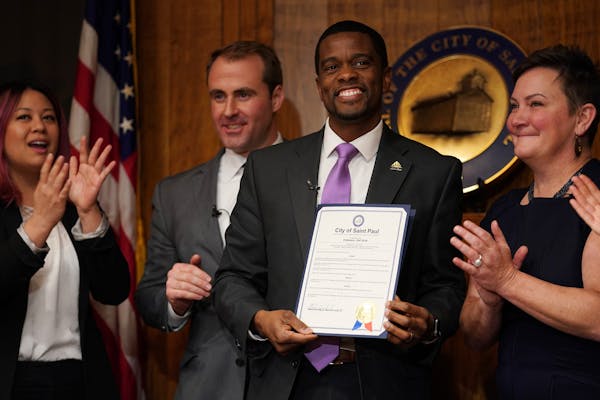After persuading Minneapolis and St. Paul to adopt a $15 minimum wage, worker advocates now plan to pressure lawmakers to bestow that same raise on every minimum-wage earner in Minnesota.
In a prelude to their broader ambitions, activists will rally this week for hundreds of low-wage workers at Minneapolis-St. Paul International Airport.
"In other states, victories in large cities have prompted the state to pass $15," said Celeste Robinson, lead organizer with 15 Now Minnesota. "What we've seen in California, in Washington state, is that having capital cities, larger economic hubs, raise the wage is one of the best things that workers can organize around to push the state toward adopting a higher minimum wage."
The midterm elections boosted support at the Capitol for a statewide wage increase, with the DFL winning the majority in the state House and the victory of DFL Gov.-elect Tim Walz, who has said he would sign a $15 minimum-wage bill into law.
DFLers who already support a $15 minimum wage said Friday that they'll likely introduce legislation on the minimum wage, as well as earned sick time and paid family leave, in 2019.
"There is, I can tell you, far more sympathy for this than there was 10 days ago, in terms of a legislative majority," said Rep. Frank Hornstein, DFL-Minneapolis, who introduced a bill last session to raise the minimum wage in the seven-country metro. "Clearly, the momentum is toward progress on this."
Uncertainties at Capitol
Beyond an early commitment to $15 an hour, there are few details about what a minimum-wage bill would include.
"I don't have a measure of the incoming governor yet, and what his priorities are going to be from the outset. We want to work cooperatively with him and his economic justice agenda," said Sen. Scott Dibble, DFL-Minneapolis, who said he or another legislator will likely introduce a minimum wage bill next session.
Republican legislators said Friday that Minnesota doesn't need to raise its minimum wage. Rep. Jerry Hertaus, R-Greenfield, who introduced a bill last session to pre-empt local wage increases, said he believes market pressures are enough to push wages higher.
The biggest obstacle to a minimum-wage hike will likely come in the Republican-controlled Senate. In a statement, Senate Majority Leader Paul Gazelka noted that Minnesota's minimum wage is higher than in bordering states and the national average.
"Many people don't know that it also automatically increases to keep up with inflation, with the next increase set to take effect in January," he said. "I think we're already ahead of the curve on this compared to other states."
The Legislature voted in 2014 to raise the state minimum wage to $9.50 an hour. It already has increased with inflation and in January will rise to $9.86 an hour for large employers and $8.04 an hour for small employers, workers in training and youth workers.
Raises for airport workers
In 2015, the Metropolitan Airports Commission (MAC) voted to raise the wages of about 2,800 employees at Minneapolis-St. Paul International Airport to a dollar above the state minimum. But employers at the airport have been having trouble finding workers, in part because of the coming wage increases in Minneapolis and St. Paul, said MAC Chairman Dan Boivin.
"What happens is there's more ability for people to say I'm unhappy here, or I don't like the transportation issues to get out to the airport, or things like that, and find a better paying job in their neighborhoods or close by," he said.
Boivin said he plans to bring up the minimum wage issue at a MAC meeting on Monday, and commissioners will continue to discuss a possible increase in the new year.
In 2014, 15 Now advocated for a $15 minimum wage for airport workers. On Wednesday afternoon, they'll return to the airport for a rally at Terminal 1.
"One of the arguments that we heard from Metropolitan Airports commissioners four years ago was, well, look, Minneapolis and St. Paul haven't done anything with this yet — we don't really want to be the ones to start the whole $15 ball rolling," said Kip Hedges, an organizer with 15 Now Minnesota who worked for nearly 30 years as a baggage handler. "But now that can't be an argument anymore."
As the push for a $15 minimum wage spreads, local leaders and businesses in other Minnesota cities are paying attention.
Suburban communities, particularly those with newly elected council members, have reached out to the Minneapolis Regional Chamber of Commerce about raising their minimum wages and implementing earned sick time policies, said President and CEO Jonathan Weinhagen.
"I could see Bloomington being a natural next location," he said. "But [activists are] also doing work in Rochester and Duluth — kind of our larger urban cores."
Concerns in Rochester
Kathleen Harrington, president of the Rochester Area Chamber of Commerce, said the chamber hasn't taken a stance on the wage issue but is concerned about the city setting its own minimum wage when the state and federal governments already do. The chamber represents about 1,500 businesses, she said, most of which have 10 employees or fewer.
"We are watchful," she said. "We're researching and we're listening very carefully about impact."
Meanwhile, the work at St. Paul City Hall continues after last week's unanimous City Council vote to raise the minimum wage citywide. Council Members Rebecca Noecker, Dai Thao and Jane Prince are crafting a policy to strengthen city support and enforcement, and Council Member Mitra Jalali Nelson said she wants to ensure the ordinance covers workers at corporate franchises.
"I think that we mark this day," Nelson said before the council vote Wednesday, "and we also know the work to fulfill the promise of this ordinance will continue."
Emma Nelson • 612-673-4509
'Human error' behind Robbinsdale shelter-in-place alert that was mistakenly sent countywide

Going to Wolves or Twins tonight? How to get there (and maybe avoid traffic).
Focusing on bringing football film into frame

